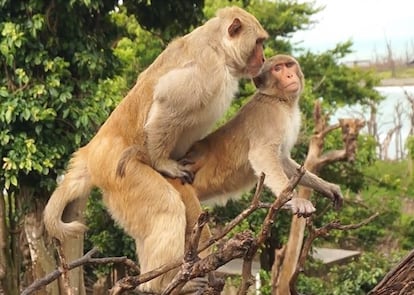The male rhesus macaques on a Caribbean island have more sex with each other than with the females
Researchers from Imperial College London note that the homosexual behavior has no negative impact on the reproduction of these primates


Homosexual behavior in the animal kingdom is quite common. It has been seen in penguins, bottlenose dolphins, bonobos and more; in addition to mammals and birds, cases have also been observed in reptiles, amphibians, fish and invertebrates. Scientists from the Imperial College London studied the sexual practices between males in a group of 236 rhesus macaques on the island of Cayo Santiago, Puerto Rico; the results were published on Monday in the journal Nature Ecology & Evolution. It is the first time that this behavior has been studied in the long term. The experts found that same-gender sexual activity may be a common trait of primates, and that it has no impact on their reproduction.
According to their observations, sexual practices between males were more frequent (72% of those studied) than between individuals of different sexes (46%). The team discovered that this behavior in rhesus macaques is related to what they refer to as “coalitionary partnerships.” Those that mount each other are more likely to aid each other in a conflict, which provides a group advantage. “We believe that the sex they practice helps them bond,” says Vincent Savaloinen, one of the authors of the study. They also think that it is precisely this coalitionary advantage that favors access to females and reproductive success.
The researchers observed that homosexual and heterosexual relationships in these animals are independent. Sometimes it is assumed that there is a compensation between one and the other, which causes them to lose reproduction opportunities – they explain in the article – but this is not the case. “The fact that they have homosexual relationships doesn’t mean that they have fewer heterosexual relationships,” points out Savaloinen. They did not see a correlation between the role of males in their sexual relationship and their social position within the group, which leads them to believe that, for rhesus macaques, affirming their hierarchical position in these practices is not important.
Another aspect that they studied was whether the homosexual behavior could have a genetic factor. Since 1956, all the individuals that inhabit the island of Cayo Santiago have been captured for identification and blood sampling. This has allowed scientists to make a family tree and notice a hereditary component: “6.4% of the variability in sexual behavior is due to their genes,” says the author. This is the first evidence of a genetic basis for this behavior in primates other than humans, the study explains.
Sex between males decreased with age, leading the researchers to believe that, among other reasons, rhesus macaques use homosexual relations as practice before mating with females. Carmen Hernández, a postdoctoral researcher at the Institute for Game and Wildlife Research (IREC), in Spain, which belongs to the University of Castilla-La Mancha and the Spanish Council for Scientific Research (CSIC), points out that this behavior has also been observed in other primates, such as baboons, although she adds that it might also be used “to establish dominance among young individuals, something that would carry less risk of injury than aggressive conflicts.”
With the results of this research, Savaloinen theorizes that the reproductive cost that homosexual relationships currently entail in humans may come from social factors typical of our societies, rather than biological reasons. The researcher says that, with their work, they want to provide a new view of the relationship between those who study the biology of homosexuality and those who carry out social and psychological research on humans, to show that they can learn from each other.
The results of the research challenge the beliefs of certain sectors of society that see homosexual relationships as something unnatural and uniquely human, state the authors. Savaloinen says that this type of work contributes to refute this notion, and hopes that it can help in the fight against homophobia. “We hope that it can open a new dialogue regarding humans,” he concludes.
Sign up for our weekly newsletter to get more English-language news coverage from EL PAÍS USA Edition
Tu suscripción se está usando en otro dispositivo
¿Quieres añadir otro usuario a tu suscripción?
Si continúas leyendo en este dispositivo, no se podrá leer en el otro.
FlechaTu suscripción se está usando en otro dispositivo y solo puedes acceder a EL PAÍS desde un dispositivo a la vez.
Si quieres compartir tu cuenta, cambia tu suscripción a la modalidad Premium, así podrás añadir otro usuario. Cada uno accederá con su propia cuenta de email, lo que os permitirá personalizar vuestra experiencia en EL PAÍS.
¿Tienes una suscripción de empresa? Accede aquí para contratar más cuentas.
En el caso de no saber quién está usando tu cuenta, te recomendamos cambiar tu contraseña aquí.
Si decides continuar compartiendo tu cuenta, este mensaje se mostrará en tu dispositivo y en el de la otra persona que está usando tu cuenta de forma indefinida, afectando a tu experiencia de lectura. Puedes consultar aquí los términos y condiciones de la suscripción digital.








































